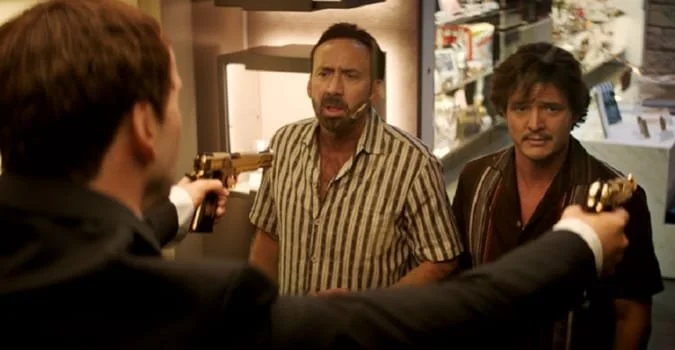THE UNBEARABLE WEIGHT OF MASSIVE TALENT
Directing: B-
Acting: B
Writing: B-
Cinematography: B
Editing: B
I have to admit, The Unbearable Weight of Massive Talent is not quite as self-referential as I expected, or perhaps even that I wanted. It would be a mistake to expect a movie in which Nicolas Cage plays himself as an overly self-absorbed and ambitious actor to go to far into a surreal dimension. Being John Malkovich, this is not, and I learned the hard way that it’s a mistake to expect anything even close to that.
In fact, that is arguably the oddest thing about The Unbearable Weight of Massive Talent—how straightforward, at times almost earnest, it is. Cage is known for making crazy acting choices, particularly late in his career, and the craziest thing about this is how not crazy it is. It’s relatively clever, to be fair, although its title is easily the most clever thing about it. And that alone sets an expectation that the film does not meet.
The script, co-written by director Tom Gormican, barely manages a handful of passing references to Cage’s past movie titles, out of a filmography of well over a hundred films. It’s gotten to the point that it feels like Nicolas Cage will just take any acting role that gets offered him. Given that Gormican has only one other motion picture to his credit (some terribly reviewed 2014 movie called That Awkward Moment), even this role, in spite of a premise that makes it sound exceptional, fits into that mold.
None of this is to say that I did not enjoy The Unbearable Weight of Massive Talent. I did. It just doesn’t feature anything close to unbearable weight or showcase anything remotely close to massive talent. It’s just a silly diversion, which may not meet its massive potential, but is still fine. I had a good time and got a few good laughs.
There’s not even as many cameos as you might expect. In the trailer, in which Neil Patrick Harris is prominently featured, it was easy to assume Harris was playing himself. He’s actually playing Cage’s talent agent. Tiffany Haddish and Ike Barinholtz play CIA agents Vivian and Martin, who throw a wrench into the plot by telling Cage the rich Spanish bachelor (Pedro Pascal) whose birthday party he’s been hired to attend is a dangerous mob criminal, and ask him to spy on him. This element of the film is what makes the plot wildly contrived, which I suppose is the point. Unfortunately, Haddish in particular gets saddled with a ton of expositional dialogue, and she is given no opportunity to let her well-known comedic talents shine.
Aside from Cage himself, who commits to this role with as much vigor as he does any, my favorite casting choice is actually that of his fictionalized ex-wife, Olivia, played by Sharon Horgan. Horgan is a reliable source for elevating whatever material she is given, and in this part, even though it constraints her talents as well, she still doesn’t disappoint.
The sort of full circle irony is that Nicolas Cage himself is what makes The Unbearable Weight of Massive Talent worth watching. He forges a friendship with Pascal’s character, Javi, and the plot revolves around their relationship—while they also work on a movie together, about a friendship between two men, in which they feel compelled to add action sequences in order to “get people into theaters.” Cage and Pascal have an unusually wholesome chemistry, and they are a big part of how this movie is, if not quite as hilarious as I hoped, surprisingly sweet.
Cage also regularly talks to an imagined, younger version of himself, with a CGI de-aged face I could have lived without. On the upside, it’s a kick to see Nicolas Cage give himself a giant kiss.
I just wish there were more moments like that. The Unbearable Weight of Massive Talent suffers from an almost shocking aversion to risk. That seems to be partly what the film itself is meant to be commenting on, except that every single thing this movie tries to do, Adaptation did better, precisely twenty years ago. That includes the movie itself veering into the very kind of storytelling on which it’s commenting. It’s no accident that Adaptation had been co-written by the brilliant Charlie Kaufman, of which this movie is a cheap imitation.
Maybe just try not to think too much about that, or that it could be argued Adaptation was Cage’s last truly great performance (seriously, just go rewatch that movie). It’s not fair to compare The Unbearable Weight of Massive Talent to an actual masterpiece. In a vacuum, this movie is entertaining enough, if not great enough to justify the money and effort to see it in a theater. Fake-Cage and Javi would be so disappointed to fall short in that ambition. But then, they would also be convinced their movie is better than it is.
“It’s . . . grotesque,” says Nicolas Cage, in a movie that should have been more grotesque.
Overall: B-

